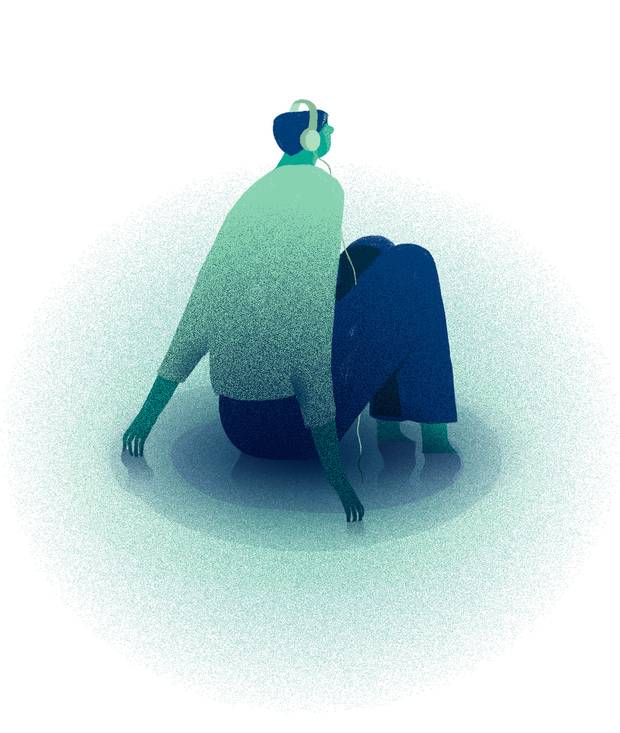First Person is a daily personal piece submitted by readers. Have a story to tell? See our guidelines at tgam.ca/essayguide.
I first attempted suicide when I was just 16 years old. At that time, whether anyone – teachers, parents, kids – wanted to talk about it or not, the reality was it had to become a discussion.
Then, last April, I happened to stumble upon 13 Reasons Why – the Netflix TV show about a high-school suicide – at the most surprising of times: A time when I was heavily considering taking my life again. The series helped me change my mind.
If you haven't seen or heard about 13 Reasons Why, the show follows a group of high-school students as they listen to 13 cassette tapes left behind by their 16-year-old classmate who has died by suicide. The tapes act as a timeline of her life and theirs which led to her death and act as a message from beyond the grave.
I watched the show with meticulous regard, taking breaks when I felt overwhelmed, stopping sometimes halfway-through episodes or waiting a week before I watched the next three.
Overwhelmed may be an understated word to fit the context. But the reality is, by the time I got to the brutality of the suicide scene which so closely mimicked my own experience, I knew suicide was no longer an option for me.
Within the 13 reasons leading to the main character's decision to die by suicide, I saw 13 reasons to reconsider.
13 Reasons Why, which returns for a second season later this year, was criticized for all the right reasons when it first appeared. Yes, the first season is graphic. Yes, it is disturbing. But are we side-stepping the focal issue here?
Suicide is a very real discussion that needs to happen. The series' co-executive producer Selena Gomez was brave enough to open the door. Whether the news surrounding the show is positive or negative, no one can deny a more open discussion about teen suicide is now active. Perhaps a more pertinent question should be: Why are we so afraid to expose the subject?
Whether the show encourages or discourages suicide is not the question. Rather, it is our society's aversion to the point being raised.
I would argue that everyone knows someone, or knows someone who knows someone, where suicide has taken a life. There is no simple way to bring forth the topic. But the reality is, teen suicide does occur, regardless of whether or not we are talking about it.
While watching the TV series, I was drawn to the inter-connectivity of humanity threaded through the storyline.
What is portrayed so beautifully within 13 Reasons are the common flaws of humanity. Simple moments, such as a classmate noticing a haircut or the serendipity of an overworked teacher being distracted from a conversation that could have changed the course of the depressed character's life, rang true for me. Even the chilling scenes of date rape and bullying and a frantic mother finding her dead daughter, not wanting to acknowledge it to be true, were believable and realistically portrayed.
I believe it is the seemingly unimportant daily details which shape our world of human connection or disconnection. Our lives are made up of a series of minute niceties or unintended mistakes. There's a popular saying that I see often: "Be kind, always, for everyone you meet is fighting a hard battle." To varying degrees, at various stages of life, we all feel emotional turmoil. Some people are simply more vulnerable to giving in to suffering as apposed to rising up and overcoming.
In the end, what made me reconsider suicide was watching the final, brutal scene depicting the suicide of the main character. I couldn't help but take note of the impact the character's death had upon everyone in her world. I couldn't help but relate to the ripple-effect a person's actions can create.
I couldn't rightfully consider removing myself from this world when the honest truth was blatantly before me: My "place" in this world is irremovable. The imprint I've left in spaces both physical and spiritual – the impression I've left deep within peoples' lives – is irrevocable. This is something that can never be undone, no matter how hard I may wish or ignore. I couldn't convince myself that true happiness would never be attained; I couldn't fully believe the notion that people truly will be better off without me; it took a tremendous amount of mental might, but I came around to understanding that maybe this life thing isn't far beyond my realm of capability. Ultimately, I could not sit through the series'$2 13 episodes and ignore the effect I have on loved ones, casual friends and strangers alike.
Some may say 13 Reasons caused a spike in teen suicide. Some may argue it put ideas into vulnerable minds. My argument for the opposing side is the aged adage of a tree falling in the forest with no one around – does it still make a sound? If we do not talk about what is already happening at alarming rates, will suicide really cease to continue? Will it diminish with silence?
I, personally, know what it is like to find reasons why death may be an appropriate solution. Some days, there may be more than 13. But watching 13 Reasons Why delivered a proposition to me that the footprint I leave in this earthly realm is larger than I imagine.
There is another season coming for 13 Reasons Why, but I doubt I will watch it. I have lived through enough personally gruesome details. I will, however, continue to talk about the issue of suicide. I will continue to be vocal about mental health.
Emily Simone Lukaszek lives in Kelowna, B.C.
